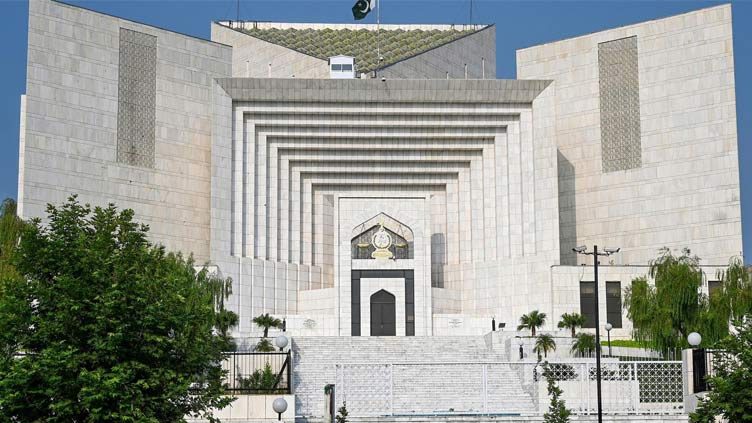Article 245 does not grant judicial powers to military, argues Imran Khan's counsel

Pakistan
Former prime minister Imran Khan’s lawyer Uzair Bhandari is presenting arguments
ISLAMABAD (Dunya News) - The Supreme Court of Pakistan resumed hearing on the intra-court appeal against the military trials of civilians on Monday.
A seven-member constitutional bench, led by Justice Aminuddin Khan, is presiding over the case. The bench includes Justice Jamal Mandokhail, Justice Muhammad Ali Mazhar, Justice Hassan Azhar Rizvi, Justice Musarrat Hilali, Justice Naeem Akhtar Afghan, and Justice Shahid Bilal Hassan.
Currently, former prime minister Imran Khan’s lawyer Uzair Bhandari is presenting arguments. Previously, Barrister Aitzaz Ahsan’s lawyer Latif Khosa had completed his arguments in the last hearing.
During the hearing, the Supreme Court questioned the relevance of Article 245 in the case. The court remarked that if the argument based on Article 245 is accepted, how will the army defend its institutions?
Uzair Bhandari argued that even if the Army Act is struck down, the Anti-Terrorism Act remains applicable. He stated that in cases where multiple forums exist, the priority should be to ensure the protection of fundamental rights. He emphasised that Article 245 does not grant judicial powers to the military.
Justice Jamal Mandokhail inquired whether a court-martial is considered a judicial proceeding. Bhandari responded that while a court-martial has judicial authority, it applies only to military personnel, not civilians.
Justice Aminuddin Khan remarked that some categories of civilians do fall under the Army Act, questioning how the distinction between those who qualify under the Army Act and those who do not will be made.
Meanwhile, Justice Naeem Akhtar Afghan questioned where the trial would be conducted if both military personnel and civilians violate the Official Secrets Act together. Bhandari replied that such cases should be heard in an anti-terrorism court, not a military tribunal.
Justice Mandokhail stated that understanding the true purpose of the Army Act would resolve half of the issue, as the constitution explicitly stated that this act is relevant only to the armed forces.
Additionally, arguments from Salman Akram Raja, representing military court convict Arzam Junaid, and Ministry of Defence’s counsel Khawaja Haris have also been concluded. The petitioner's lawyer, Khawaja Ahmad Hussain, has already finished his arguments.
It is noteworthy that the federal government, Punjab, Balochistan, the Ministry of Interior, the Ministry of Law, and the Martyrs’ Foundation have aligned themselves with the arguments presented by Ministry of Defence’s counsel Khawaja Haris.


